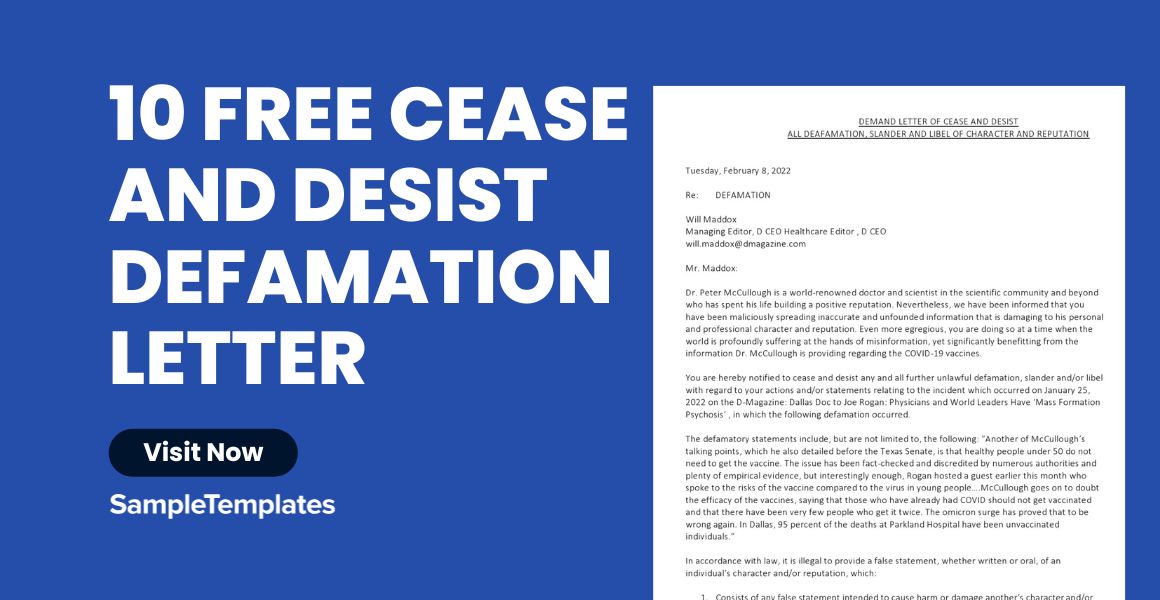Facing defamation can be a distressing experience, whether it’s in a personal or professional context. Defamatory statements, whether slanderous or libelous, can tarnish your reputation and have long-lasting effects. This is where a well-crafted Cease and Desist Defamation Letter comes into play. Our template is designed to provide a clear, assertive, and legally sound approach to confronting and stopping defamatory remarks. It serves as an effective first step in protecting your reputation, signaling your readiness to take further legal action if necessary. Ideal for individuals, professionals, and businesses, this letter template is a vital tool in your arsenal against defamation, ensuring your rights and dignity are upheld. With easy customization and straightforward language, it helps you communicate your stance against defamation firmly and legally.
1. Sample Cease and Desist Letter
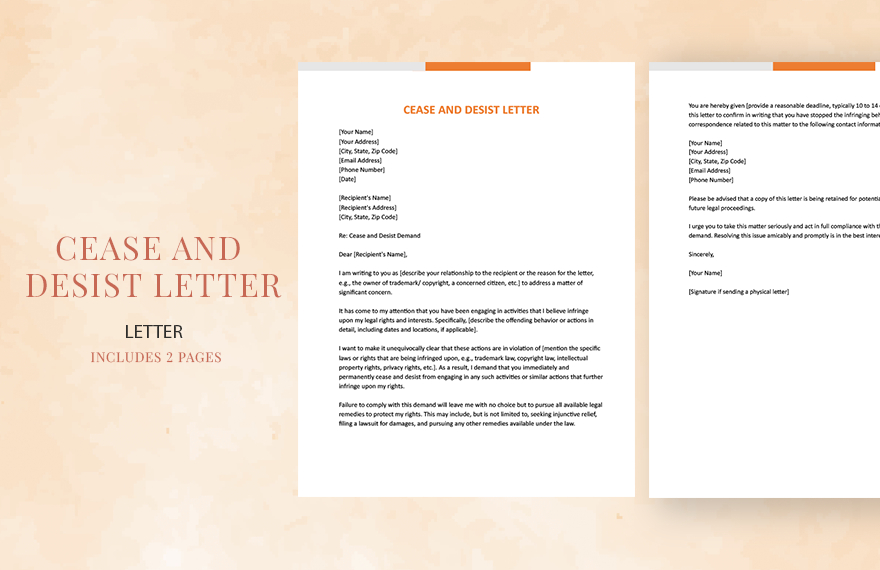
2. Employment Cease and Desist Letter Template
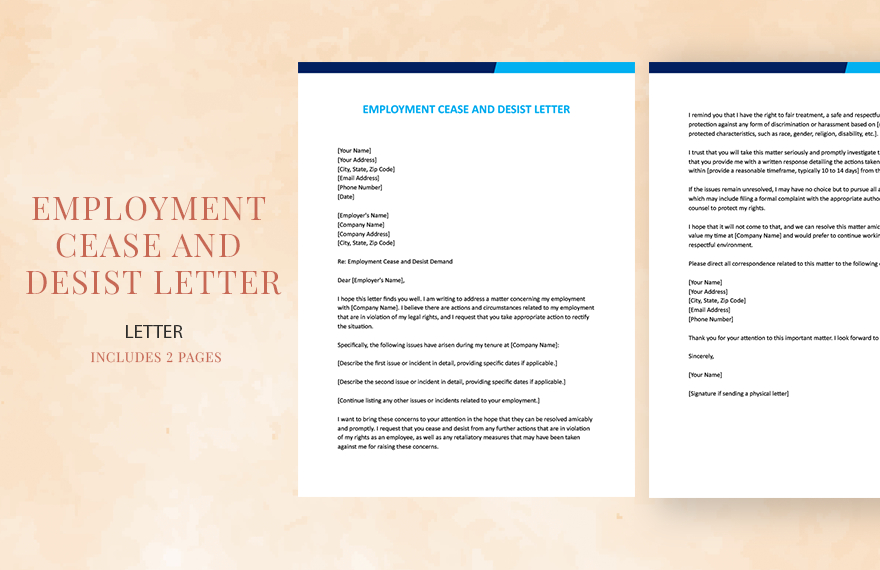
3. Sample Warning Cease and Desist Letter
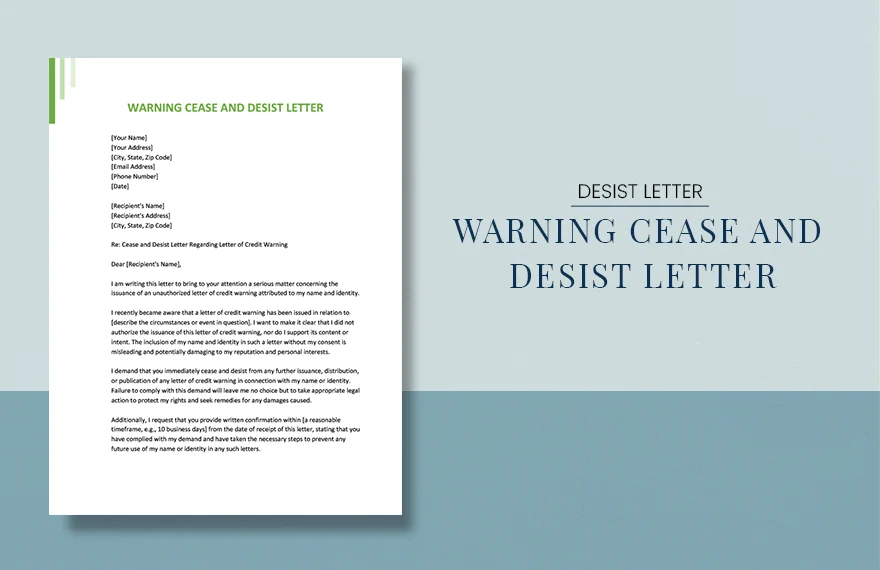
Can you write a cease and desist letter for defamation?
Creating a comprehensive and effective cease and desist letter for defamation involves several key steps. This guide will walk you through the process of drafting a letter that is legally sound and clearly communicates your stance against defamatory statements.
Understanding Defamation
Before drafting a cease and desist letter, it’s essential to understand what constitutes defamation. Defamation is the act of making false statements about an individual that harm their reputation. It is categorized into slander (spoken) and libel (written). Recognizing whether the damaging statements about you are defamatory under the law is the first crucial step.
Gathering Essential Information
Start by identifying the specific defamatory statements. Detail where and when these statements were made and by whom. Collecting evidence, such as screenshots, recordings, or witnesses’ statements, is crucial. This information will form the basis of your cease and desist letter.
Drafting Your Letter
A cease and desist letter should start with your personal information, followed by the recipient’s details. The subject line should be clear and direct. In the body of the letter, describe the defamatory statements and explain why they are harmful and untrue. State the legal implications of defamation and make specific demands, such as ceasing the defamation, retracting statements, and issuing an apology. Outline the potential legal consequences if the recipient fails to comply with your demands. Conclude your letter firmly, and remember to sign it.
Legal Considerations
Review the letter thoroughly to ensure it is clear and factual. Avoid emotional language or personal attacks. Consulting with a legal professional can provide valuable insights, especially in complex cases. This step is crucial to ensure that your letter adheres to legal standards and effectively communicates your stance.
Sending the Letter
Choose a delivery method that provides proof of receipt, such as registered mail or courier service. This proof is vital should you need to take further legal action.
Post-Delivery Actions
Keep a copy of the letter and all communication records for future reference. If the defamatory statements continue or there is no response, consider consulting with a lawyer to discuss further legal actions.
A cease and desist letter for defamation is a serious document that can have significant legal implications. It’s a preliminary step in resolving defamation issues and can potentially prevent the need for more extensive legal action. Tailoring the letter to your specific situation and ensuring it complies with legal standards is key to its effectiveness.
4. Notice to Cease and Desist Letter Template
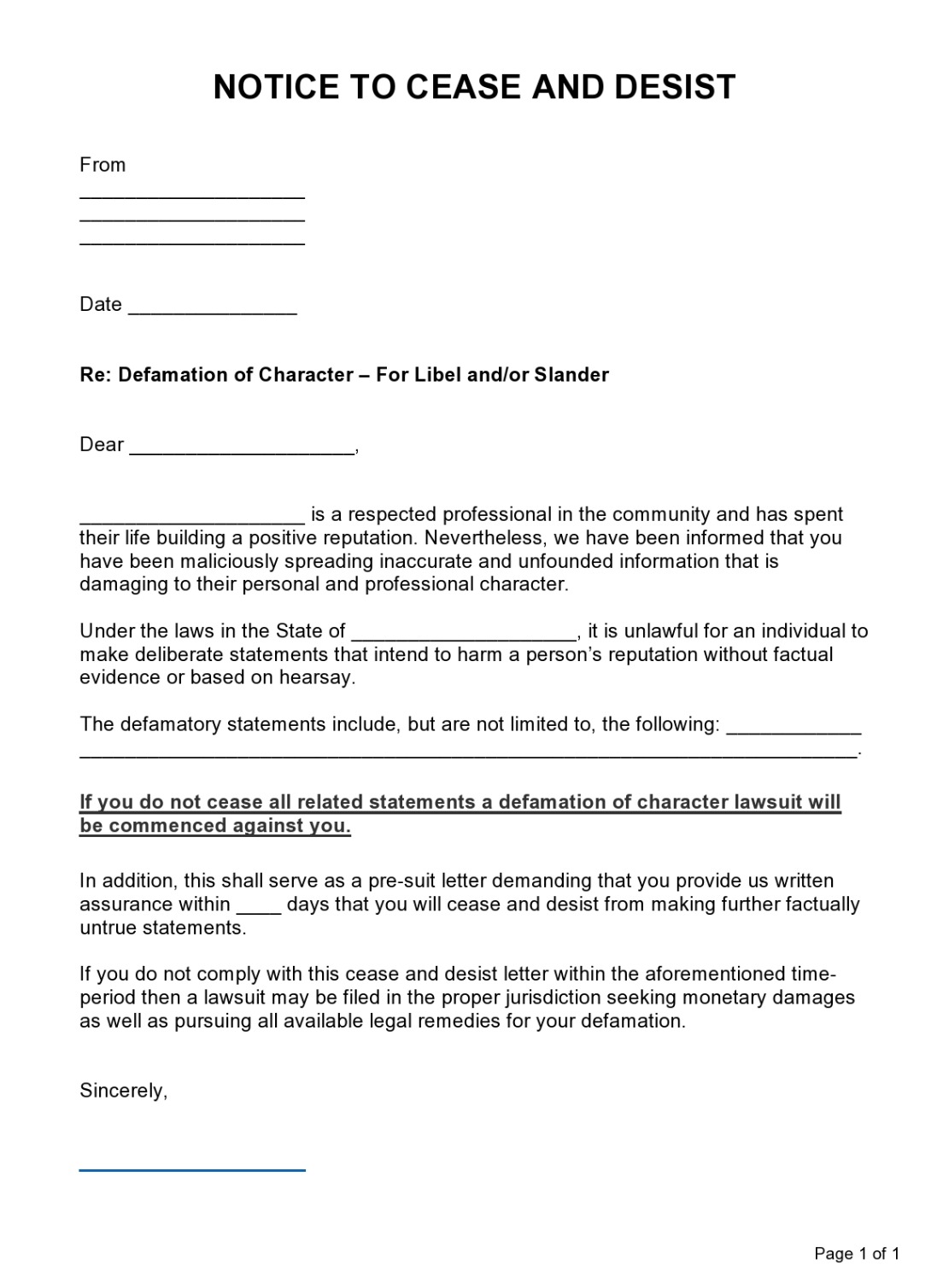
5. Request to Cease and Desist Defamation Letter
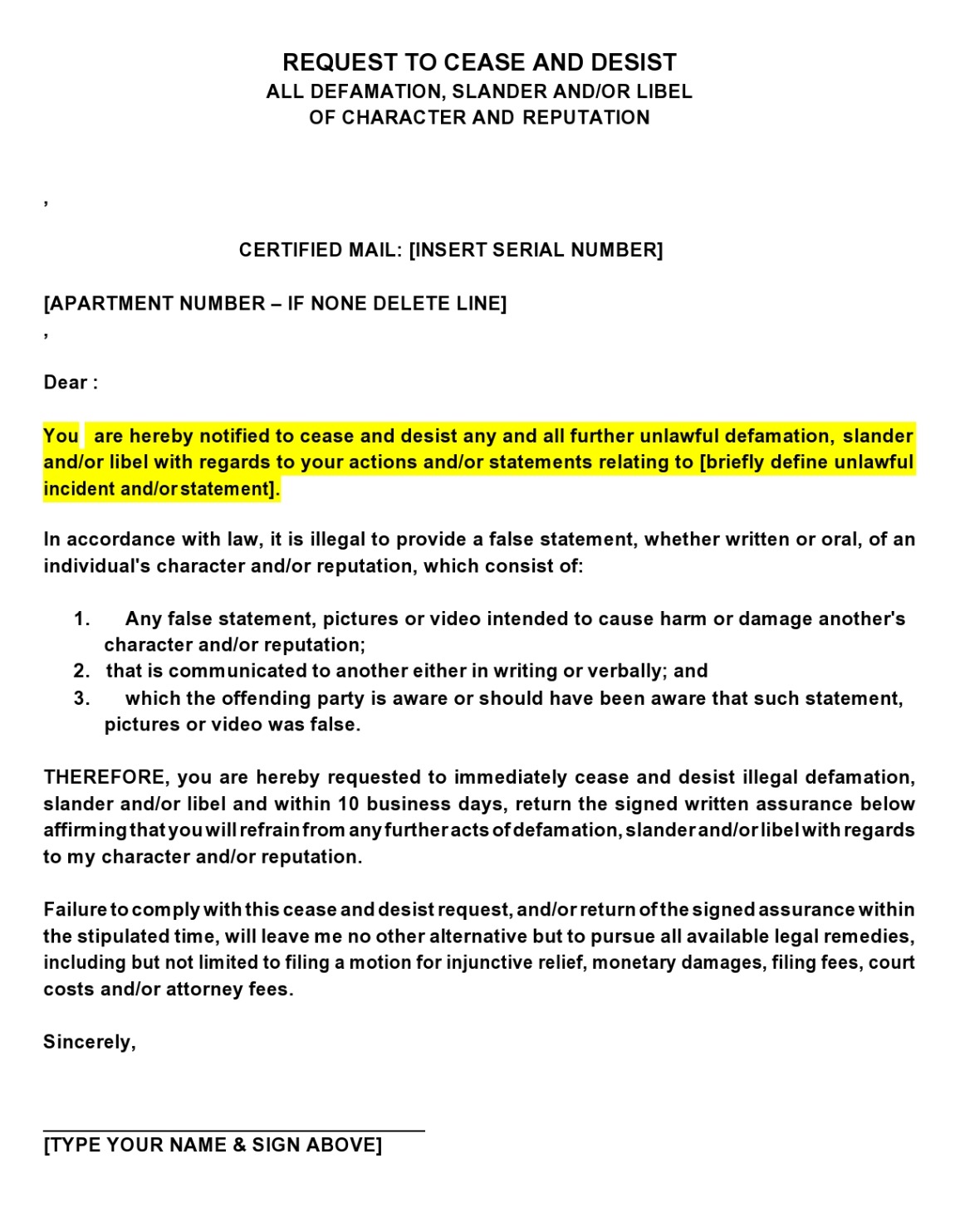
6. Sample Cease and Desist Defamation Letter
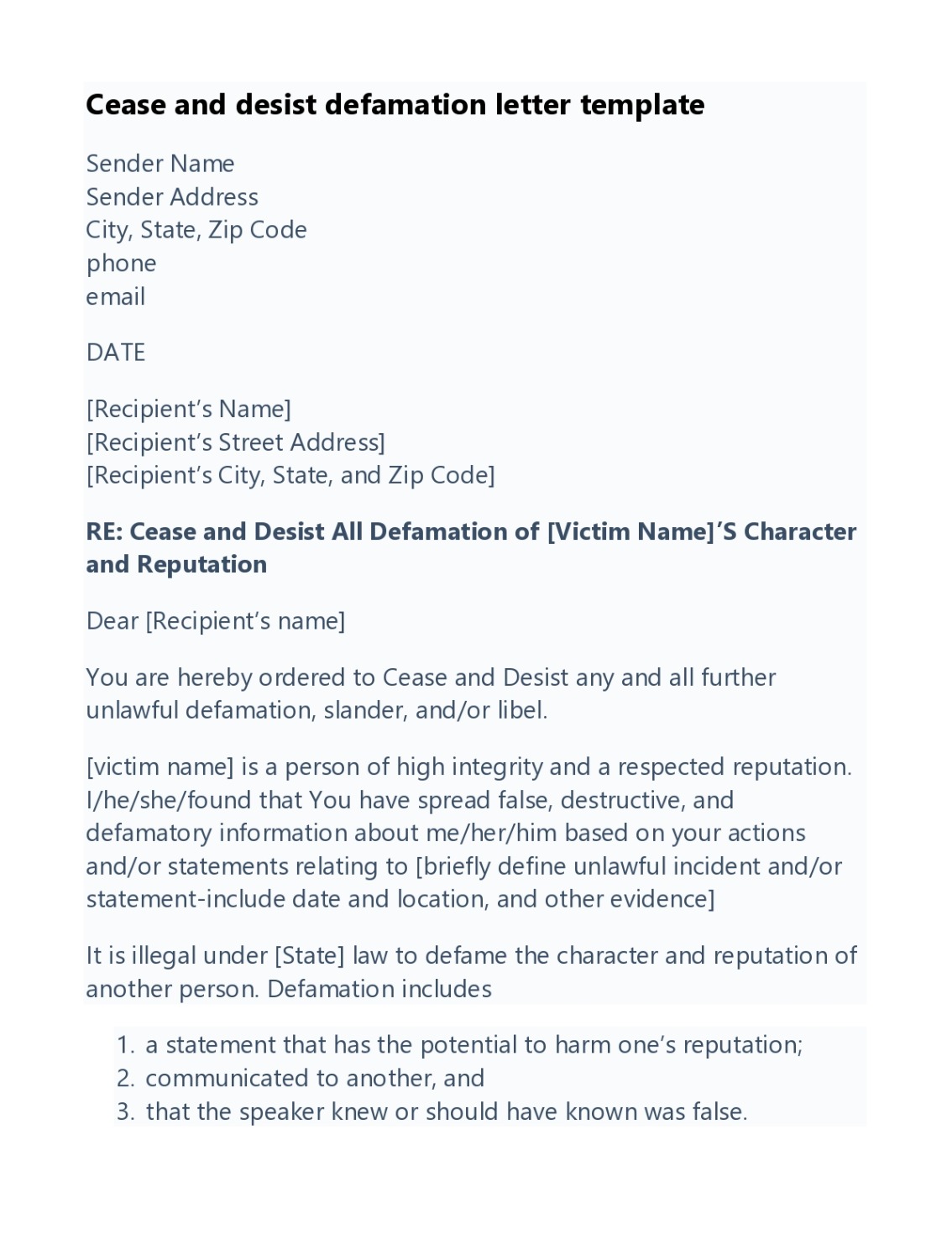
How serious is a cease and desist letter?
A cease and desist letter is often the first formal step taken in a dispute, signaling serious intent to pursue legal action if the issue at hand is not resolved. This letter serves as a formal request to halt actions deemed harmful or illegal by the sender, and its seriousness should not be underestimated.
Legal Weight and Implications
The cease and desist letter itself is not a legally binding document nor an official court action. However, it carries significant legal weight as it is often used to establish that the sender formally notified the recipient of an issue and requested a resolution. This can be important in any subsequent legal proceedings, as it demonstrates an attempt to resolve the matter amicably before escalating to litigation. Failure to comply with the demands set out in the letter could potentially weaken the recipient’s position in future legal actions.
Psychological Impact
The receipt of a cease and desist letter can have a substantial psychological impact. It communicates that the sender is serious about their allegations and willing to take further legal steps. For businesses, it can signal potential reputational harm or financial loss. For individuals, it may cause stress or anxiety about potential legal battles.
Setting the Stage for Litigation
While a cease and desist letter is not a lawsuit, it can be a precursor to one. It often outlines the sender’s grievances and demands, setting the stage for legal arguments that might be used in court. It also provides the recipient an opportunity to cease the offending behavior and rectify the situation, potentially avoiding litigation.
Negotiation and Resolution
In many cases, a cease and desist letter can open the door to negotiations. It can act as a catalyst for dialogue between the parties, allowing them to discuss and potentially resolve the issue without resorting to a lawsuit. This can be a less expensive and less time-consuming way to address disputes.
Importance of Professional Drafting
Given the seriousness of a cease and desist letter, it’s crucial that it is drafted professionally. This ensures the letter is clear, legally sound, and effectively communicates the sender’s position and demands. A poorly drafted letter can weaken a legal position or even escalate the situation unnecessarily.
A cease and desist letter is a powerful tool in dispute resolution. It should be used judiciously and, ideally, drafted with the assistance of legal counsel. Its significance lies not just in its ability to potentially resolve disputes without litigation, but also in its role as a formal record of a dispute and an attempt at resolution, which can be crucial in any subsequent legal proceedings. Therefore, both senders and recipients should treat cease and desist letters with the seriousness they deserve.
7. Demand Letter of Cease and Desist Defamation Template
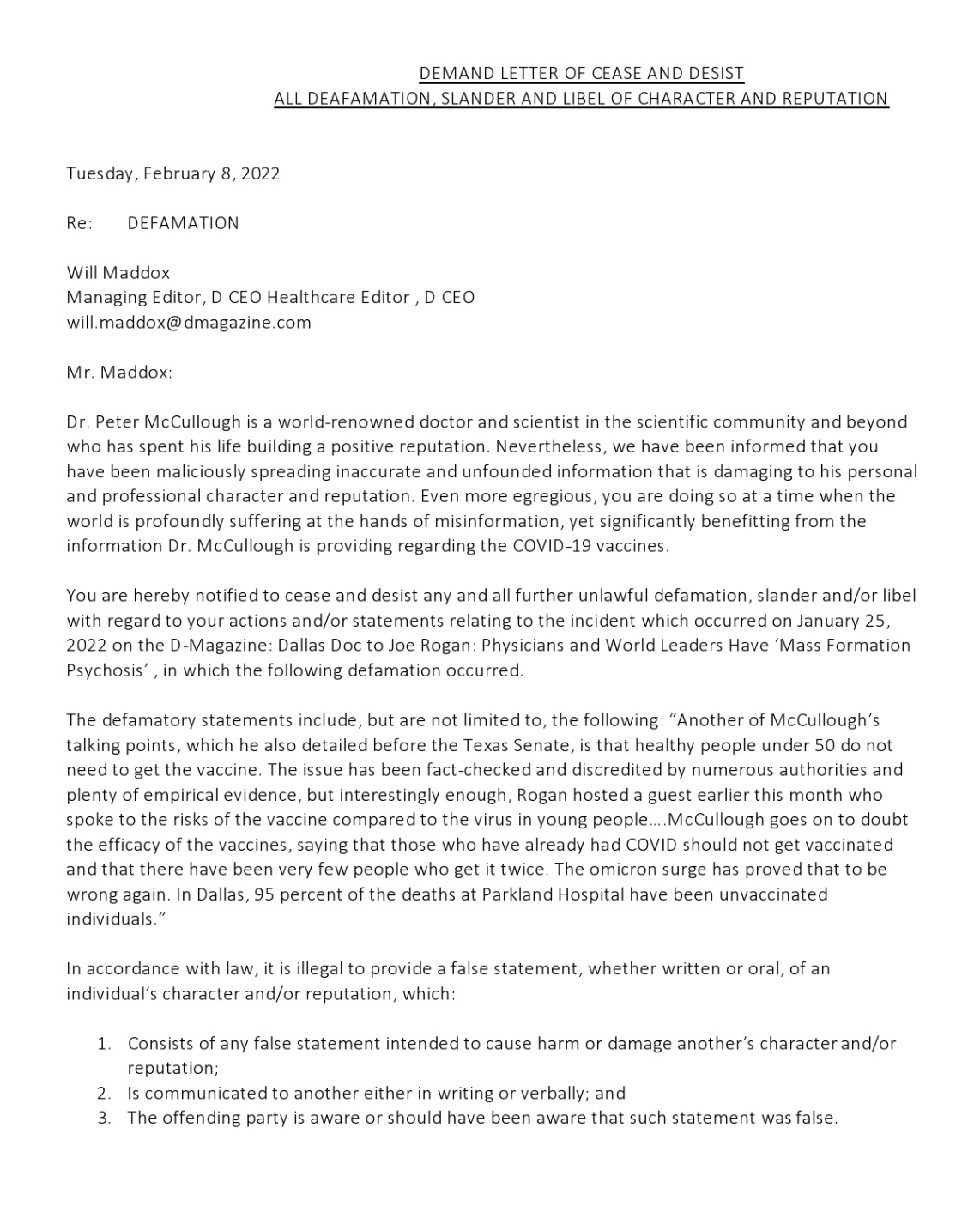
8. Sample Cease and Desist Defamation Form
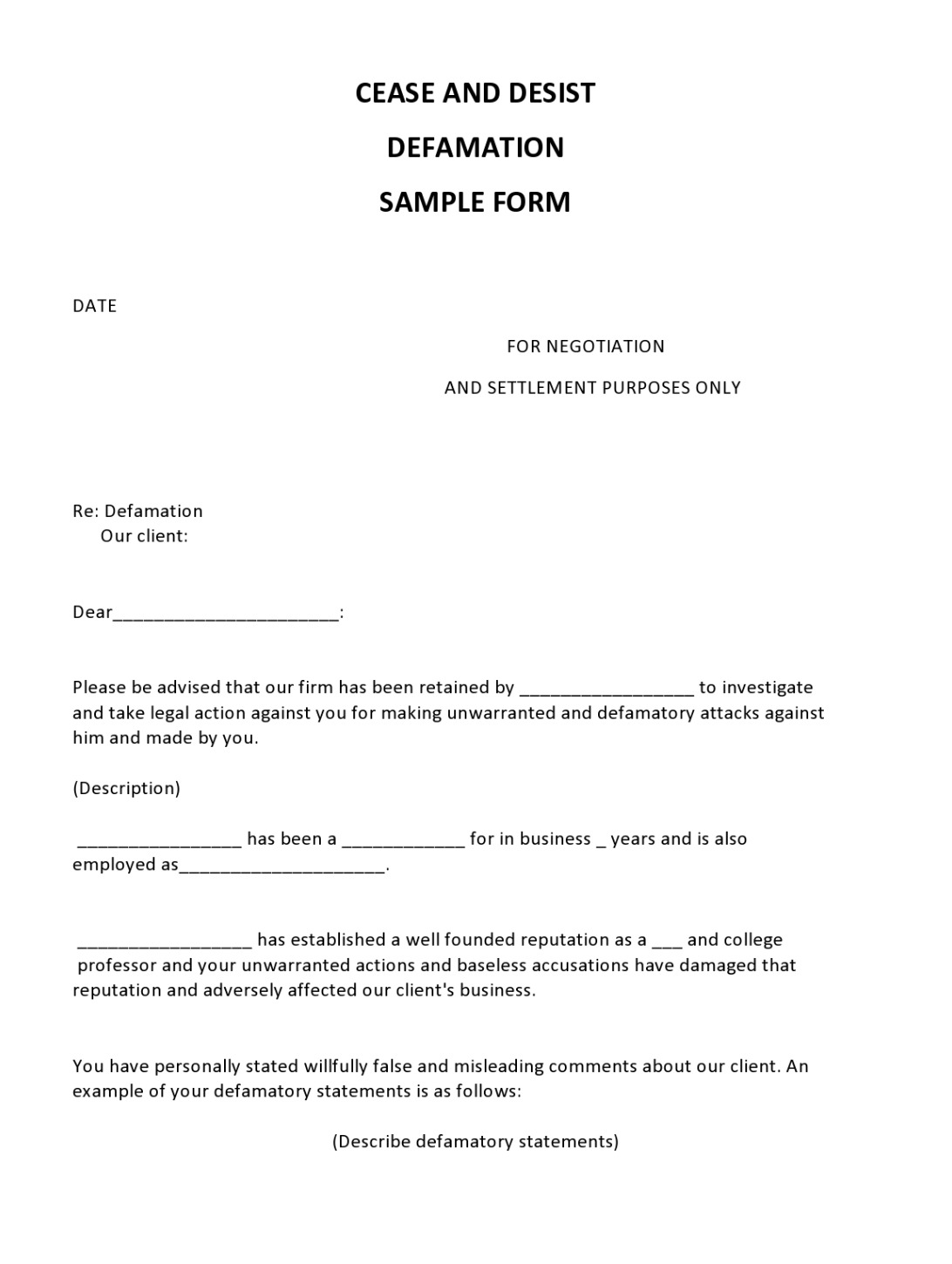
How to write a cease and desist letter for defamation
Writing a cease and desist letter for defamation requires a careful approach, as it involves addressing a serious legal issue while maintaining professionalism and clarity. A well-crafted letter can effectively communicate your demand to stop defamatory actions and lay the groundwork for legal action, if necessary. Here’s a detailed guide on how to write such a letter:
Understanding Defamation
Defamation involves making false statements that harm someone’s reputation. It’s categorized into two types: slander (spoken) and libel (written). Identify whether the statements you are addressing are defamatory under the law, as this sample forms the basis of your letter.
Collecting Evidence
Gather evidence of the defamatory statements. This could include screenshots, recordings, printed materials, or witness statements. Accurately documenting these instances is crucial for your letter and any potential legal proceedings.
Drafting the Letter
Introduction: Begin with your personal information (name, address, contact details) followed by the recipient’s information. Use a clear subject line like “Cease and Desist – Defamation Notice.”
Detail the Defamatory Statements: Clearly describe the defamatory statements, including specifics on what was said or written, by whom, and when. This section should be factual and devoid of emotional language.
State the Legal Basis: Explain that the statements made are defamatory and are causing you harm. Briefly touch upon the legal implications of defamation without going into excessive legal jargon.
Demand for Action: Clearly state your demands, which may include:
- Immediate cessation of all defamatory statements.
- A retraction of the statements made in a manner you deem appropriate.
- An apology, if you see it fit.
Consequences of Non-Compliance: Indicate that failure to comply with your demands may result in legal action, including but not limited to seeking monetary damages.
Set a Deadline: Provide a reasonable deadline for the recipient to respond or comply with your demands.
Concluding Remarks: End the letter on a firm but respectful note, emphasizing your desire to resolve the matter amicably if possible.
Signature: Sign the letter with your full name.
Legal and Professional Tone
Maintain a professional and objective tone throughout the letter. Avoid aggressive or threatening language. The goal is to assert your legal rights while opening the door for possible resolution.
Consultation with Legal Counsel
Consider consulting with a lawyer to ensure that the letter is legally sound and to understand the implications of your demands. A lawyer can also advise on the best course of action depending on the recipient’s response.
Sending the Letter
Send the letter via a trackable method, like registered mail, to ensure you have proof of delivery. Keep a copy of the letter and any related communications for your records.
A cease and desist letter for defamation is a critical document that requires careful consideration and precision. It is the first step in addressing and potentially resolving a defamation issue outside of court. By following these guidelines, you can craft a letter that is clear, legally grounded, and effective in communicating your stance on the defamatory matter.
9. Sample Trademark Cease and Desist Letter
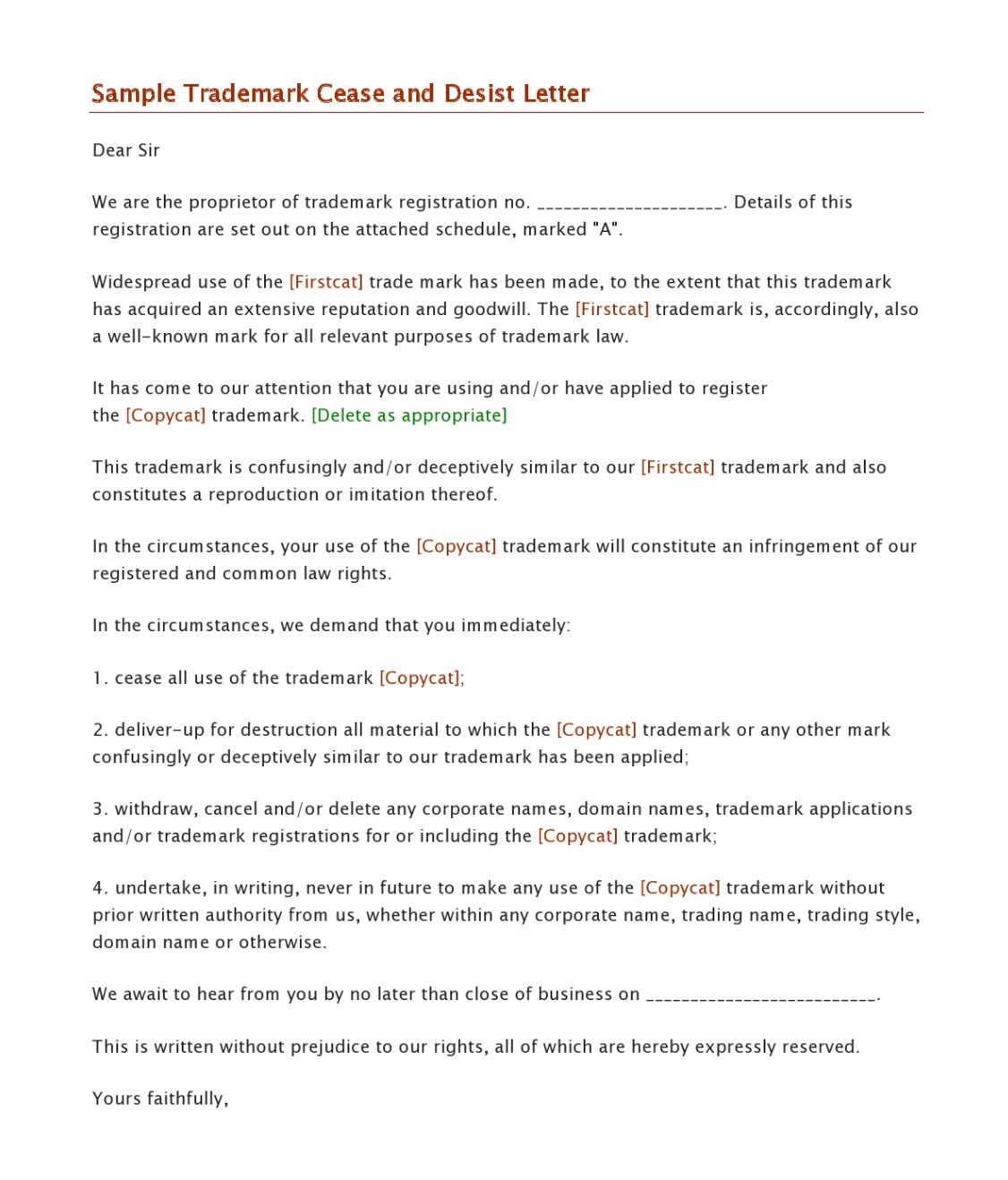
What happens if you ignore a cease and desist?
Ignoring a cease and desist letter can lead to a range of consequences, depending on the nature of the dispute and the intentions of the party who sent the letter. A cease and desist letter is typically sent to formally request that an individual or organization stop an allegedly harmful activity. Here’s what could happen if such a letter is ignored:
Escalation to Legal Action
Initiation of a Lawsuit: The most direct consequence of ignoring a cease and desist letter is the potential for the sender to initiate
legal proceedings. The letter often serves as a precursor to a lawsuit, indicating that the sender is serious about their claims and willing to pursue legal remedies.
Legal Advantage: Ignoring the letter can be used against you in court. The sender might argue that they attempted to resolve the issue amicably and your non-response demonstrates disregard for the legal process or the rights of the aggrieved party.
Financial Implications
Legal Costs: If the matter escalates to a lawsuit and you lose, you could be responsible for legal costs, including the plaintiff’s attorney fees, in addition to any damages awarded.
Damages: In cases of defamation, copyright infringement, or other similar issues, damages can be substantial, including compensatory and possibly punitive damages.
Reputational Impact
Public Perception: For businesses, ignoring legal issues can harm their reputation. Customers and partners may view the company as irresponsible or untrustworthy.
Long-Term Reputation Damage: In the digital age, legal disputes can quickly become public and have long-lasting effects on an individual’s or a company’s reputation.
Operational Disruptions
Business Operations: For businesses, legal battles can be a significant distraction and drain on resources. They can divert attention from regular business operations and strategic goals.
Personal Stress: For individuals, ongoing legal issues can cause significant stress and anxiety, impacting personal and professional life.
Injunctions and Court Orders
Court-Enforced Actions: A court might issue an injunction, ordering you to stop the alleged activity immediately. Failure to comply with court orders can lead to additional legal penalties, including contempt of court.
Settlement and Negotiation Opportunities Lost
Missed Opportunities for Amicable Resolution: By ignoring the letter, you might miss an opportunity to negotiate or settle the matter out of court, potentially on more favorable terms.
Ignoring a cease and desist letter is generally not advisable. It’s important to take such letters seriously and consider seeking legal advice. Responding appropriately can prevent the escalation of the dispute, save on potential legal costs, and mitigate reputational harm. Whether you agree with the claims made in the letter or not, addressing it promptly and thoughtfully is crucial in managing the situation effectively.
10. Sample Cease and Desist Letter for Debt Collection
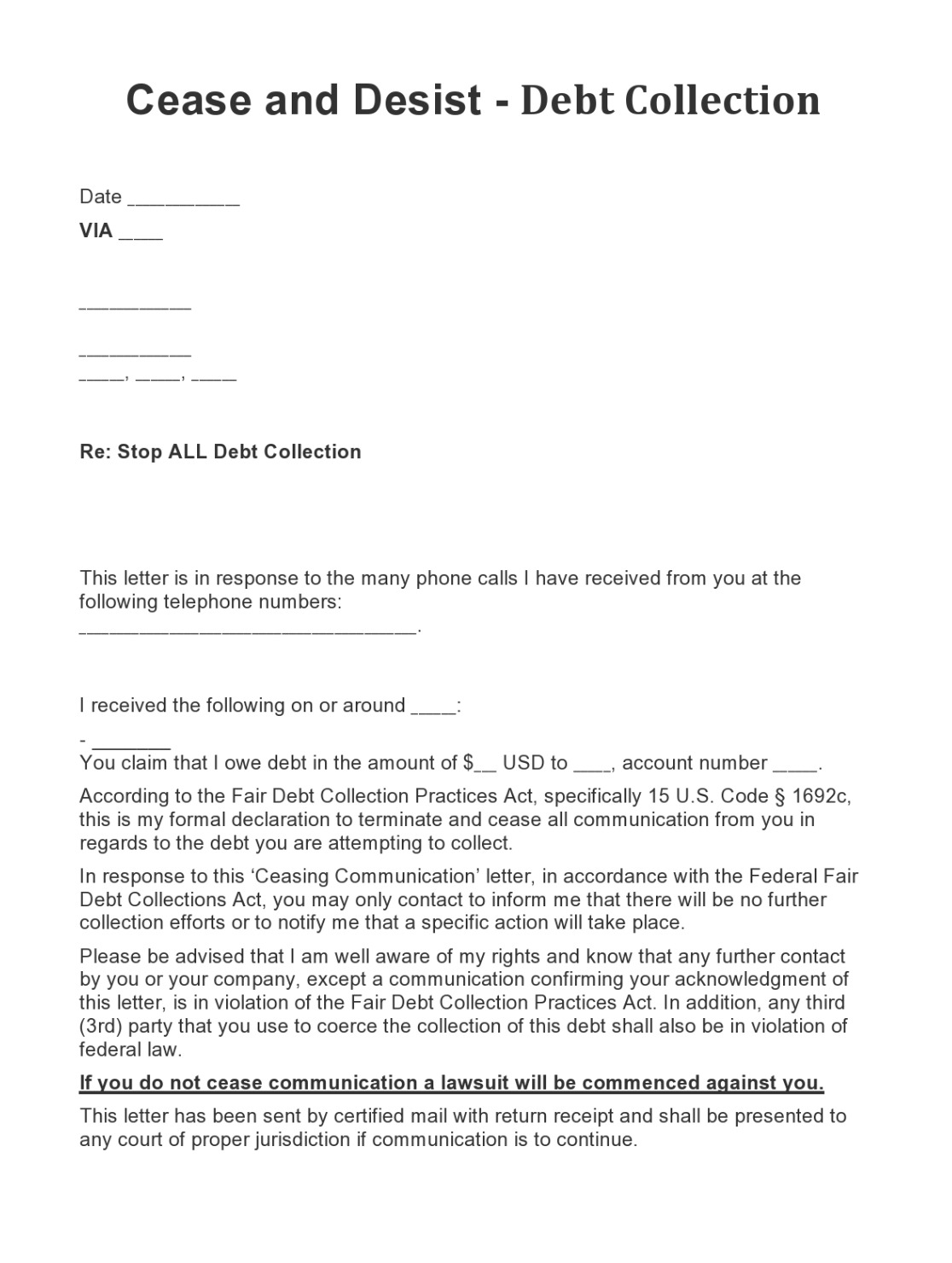
A Cease and Desist Defamation Letter is a formal document sent to an individual or entity demanding that they stop making defamatory statements – false statements that harm someone’s reputation – and rectify the harm already done.What is a Cease and Desist Defamation Letter?
You should consider sending a Cease and Desist Defamation Letter if someone has made false statements about you that are damaging your reputation, either personally or professionally.When should I send a Cease and Desist Defamation Letter?
While the letter itself is not legally binding, it serves as a formal request and can be used as evidence in court if the situation escalates to a lawsuit.Is a Cease and Desist Defamation Letter legally binding?
The letter should include a clear description of the defamatory statements, an explanation of why these statements are false and harmful, a demand for the immediate cessation of such statements, a request for retraction and/or apology, and a statement of intent to pursue legal action if the demands are not met.What should be included in a Cease and Desist Defamation Letter?
Yes, you can draft the letter yourself, but it is advisable to consult with a legal professional to ensure that it is appropriately written and to understand the potential legal implications.Can I write a Cease and Desist Defamation Letter myself?
While you can state your intent to seek damages, the actual awarding of damages would typically occur in a court proceeding, not through the letter itself.Can I claim damages in a Cease and Desist Defamation Letter?
Related Posts
Letter of Intent Samples & Templates
Letter of Intent for a Job Samples & Templates
Lease Proposal Letter Samples & Templates
Letter of Inquiry Samples & Templates
Character Reference Letter Samples & Templates
Claims Letter Samples & Templates
Response Letter Sample & Templates
Follow Up Letter Samples & Templates
Sample Project Proposal Letter Templates
Donation Letter Samples & Templates
Addressing a Formal Letter Samples & Templates
Grievance Letter Samples & Templates
Sample Sponsor Thank You Letter Templates
Sample Letters of Request
Sample Cover Letter for Teacher
